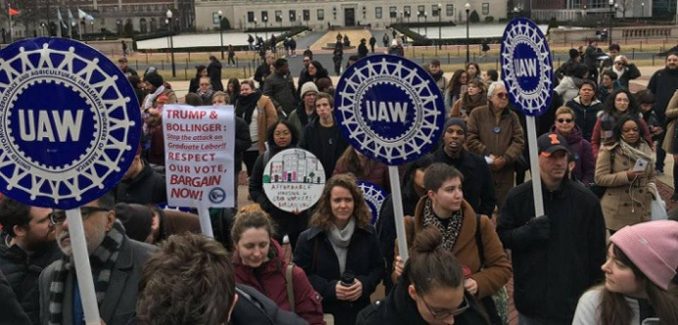No union-busting at Columbia University
New York City — Unions and allies at Columbia University are gearing up for a militant protest against “right-to-work-for-less” right-winger Mark Mix, scheduled to speak on campus Feb. 27. That’s the day after the U.S. Supreme Court hears the union-busting Janus v. AFSCME case. University union organizers are calling on all union workers in New York City to join them — not just because the Janus ruling will impact a large segment of workers — but because when workers fight together, they win.
Mix is president of the National Right to Work Foundation, largely responsible for pushing anti-union legislation across the U.S. in the last decade. While the foundation may not be mounting a campaign to terrorize oppressed people in the streets, like the Nazis and Klan are trying to do, “right to work” is merely a different way of creating hell for working and oppressed people in the U.S.
In fall 2017, students, workers and community members from Columbia University and across New York City marched to protest the College Republicans’ decision to invite white supremacists to speak on campus. This is the determined opposition planned for Feb. 27 to “right-to-work-for-less” Mix.
“Right-to-work” law is not just a cleverly named policy created by the right wing to bust unions and erode the power of working-class people. “Right to work” was originally a racist attempt to drive a wedge between Black and white workers. The policy was developed by Texas businessman and Ku Klux Klan sympathizer Vance Muse, at the height of the 1930s U.S. labor struggles. Rabid white supremacists like Muse were worried about the equality between Black and white workers promoted by unions like the Congress of Industrial Organizations. Other capitalists saw that dividing workers could lower wages and eliminate benefits, and began adopting Muse’s program.
Today, the National Right to Work Foundation continues that racist legacy, especially in relation to the Janus case, which Mix was invited to speak on. The Feb. 26 Supreme Court hearing will feature legal arguments as to whether “right-to-work” legislation applies to the public sector, which is composed primarily of workers of color and women.
If the Supreme Court sides with the right wing — and, with Trump’s recent appointment of Chief Justice Neil Gorsuch, it seems likely — this could be a huge blow to one of the last bastions of working-class power in the U.S. Currently, barely 11 percent of all workers are unionized, with a majority of them in the public sector.
The legislation allows workers to opt out of union dues while still requiring the union to support these workers. With this loss of funding, a union becomes less able to fight off attacks by the bosses.
And the attacks won’t stop. In each contract negotiation, the bosses will fight to lower wages, roll back benefits and chip away at the union’s membership base. New workers, without understanding the importance of unions, will only experience the weakened unions and assume it’s not worthwhile to pay dues, further eroding union power and reducing union numbers.
Fighting “right to work” at Columbia
At Columbia University, a private employer, a negative Janus ruling would not apply to most employees. However, the National Right to Work Foundation has still played a role in helping the Columbia administration to weaken working-class power on campus.
The foundation submitted an amicus brief in support of the Columbia administration in its negotiations with graduate workers who voted to unionize in 2014. Recently, the university officially refused to recognize the graduate workers’ union. Graduate students are a major source of labor in the academy, both in teaching classes and in conducting research that gains grants and funding for the university. They are workers, but the university as well as the foundation refuse to acknowledge this.
Columbia welcomed the National Right to Work Foundation support because, for the last several decades, the university has been waging a war on its workers. While Columbia has a façade of progressivism, it behaves no differently than a typical capitalist firm, which means busting unions, lowering wages and rolling back benefits. While replacing full-time faculty with precarious adjunct professors, Columbia has also filled its board of trustees with bankers, CEOs of investment firms and real estate moguls.
On the afternoon of Feb. 27 there will be a press conference to give a working-class perspective on “right-to-work” legislation and the need to protest Mix’s appearance at Columbia. See https://www.facebook.com/events/1372466682859407/
On the evening of Feb. 27, join with union members and allies on campus in protesting “right-to-work-for-less” Mix — including 1199SEIU, United Auto Workers Local 2110, Barnard College Contingent Faculty and the Graduate Workers Union, as well as student groups like Student Worker Solidarity and the Liberation Coalition.
More info at https://www.facebook.com/events/755569144634545/
After decades of attacks on unions, workers are forging solidarity to reverse the tide, and communities that benefit from strong working-class organizations are joining in support.
Come out to Columbia University on Feb. 27 to say: Unions, yes! When we fight together, we win!


